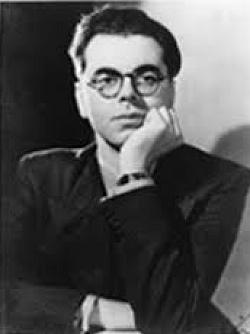LEGENDS OF
LIGHT MUSIC
William Lloyd Webber

WILLIAM LLOYD
WEBBER – An Unsung English
Composer
By EDMUND WHITEHOUSE
Lloyd Webber is a
familiar musical surname because
both Andrew and Julian are
experts in their own particular
field — but what about their
father, William? What indeed? For
here was a man who, like many
other tuneful composers of his
generation, began to believe that
his romantic, melodic music would
never win acceptance during the
fifties era of serialism and
atonality.
Born into a poor
London family in 1914 William
Lloyd Webber was the son of a
self-employed plumber but in
those days all music was home
made and, as his father was keen
on organs, young William was able
to accompany him all over London
to hear the king of instruments
in all its glory. It was a fine
musical apprenticeship and by the
age of just 14 William was
proficient enough to give public
recitals. As he grew older he
spread his metaphorical wings and
travelled all over the country
playing in several large churches
and cathedrals.
It was no surprise
when he won an organ scholarship
to Mercer's School, a prestigious
seat of learning established in
the 16th century by the premier
Livery Company in the City of
London but, like many similar
ancient Metropolitan foundations,
sadly closed its doors in 1959,
dispersing its pupils outwards in
the process. Next academic stop
was a scholarship to the Royal
College of Music where he studied
composition under no less a
person than Ralph Vaughan
Williams and, clearly a prodigy,
gained his FRCO diploma at the
age of only 19.
Parallel to his
activities as an organist, he
began composing, and several
interesting works date from this
early period including the
Fantasy Trio of 1936. The Second
World War, however, interrupted
everything and although he
continued as organist and
choirmaster at All Saints,
Margaret Street, writing music
took a back seat. By the time
hostilities ended, therefore, he
was more than ready to re-embark
on what became his most prolific
period of composition. His
wartime marriage to Jean Hermione
Johnstone, a violinist and
pianist, also produced arguably
the finest musical dynasty of
modern times with Andrew born in
1948 and Julian in 1951.
From 1945 to the
mid-1950s William Lloyd Webber
wrote music in many different
forms: vocal and instrumental,
choral and organ, chamber and
orchestral. Works from this time
include the oratorio St. Francis
of Assisi, the orchestral tone
poem Aurora (in which there are
unmistakable traces of Delius),
the Sonatinas for both viola and
piano, and flute and piano, plus
numerous songs, organ pieces and
choral works.
His roots were
firmly embedded in the
romanticism of composers like
Franck, Rachmaninov and Sibelius
and because of this he became
increasingly convinced his music
was out of step with modern
times. He was far from alone,
however, and other fellow tuneful
composers from this period fared
just as badly. It is a national
disgrace that such a thing was
ever allowed to happen and one of
the purposes of this series is to
shed ever increasing light on an
almost lost generation whose rich
canon all but disappeared until
rescued by a later generation
who, with the benefit of
hindsight, now recognise the
musical emperors of the time were
strutting around with no clothes
on.
Rather than
compromise his tuneful style,
William immersed himself in
teaching at the Royal College of
Music. Then, in 1964, he accepted
the position of Director of the
London College of Music.
Disillusioned with composition,
he wrote almost nothing for
around 20 years until shortly
before his death in 1982, when a
sudden flowering of creativity
produced a number of works
including the massMissa Sanctae
Mariae Magdalenae.
By nature William
was a shy and introverted
character. Like many fine musical
practitioners he disliked
self-promotion and eschewed the
cut and thrust which he perceived
necessary for the furtherance of
his career. He wasted few words,
both literally and in his music,
and sometimes challenged his
pupils about the need to state a
theme clearly and concisely
rather than pad it out with what
others might regard as trivia.
He possessed a
remarkable melodic gift which he
frequently allied with
surprisingly "purple"
harmonies. He knew exactly what
he wanted to say and how to say
it. When Aurora was recorded in
1986 by Lorin Maazel and the
London Philharmonic Orchestra, it
was a total revelation and the
music critic Edward Greenfield
said in The Guardian that it was
"skilfully and sumptuously
scored .... music as sensuous as
any you will find from a British
composer". Why then has his
music remained virtually
undiscovered for so long?
Happily, works
that have lain unpublished and
unperformed for many years have
gradually come to light and it is
to be hoped the 21st century
will, at long last, fully reveal
in all its glory, the great
British legacy from the middle of
the previous century. William
Lloyd Webber is an integral part
of this period and, thanks to the
recorded art, we can listen again
to his music as if it was
composed only yesterday. Much the
best way is to buy the Chandos CD
Invocation with the City of
London Sinfonia conducted by
Richard Hickox, CHAN 9595. Enjoy
it!
This article,
which has been adapted for JIM by
the author, originally appeared
in the magazine "This
England" and is reproduced
by kind permission. It appeared
in ‘Journal Into
Melody’, issue 195, April
2013.
|